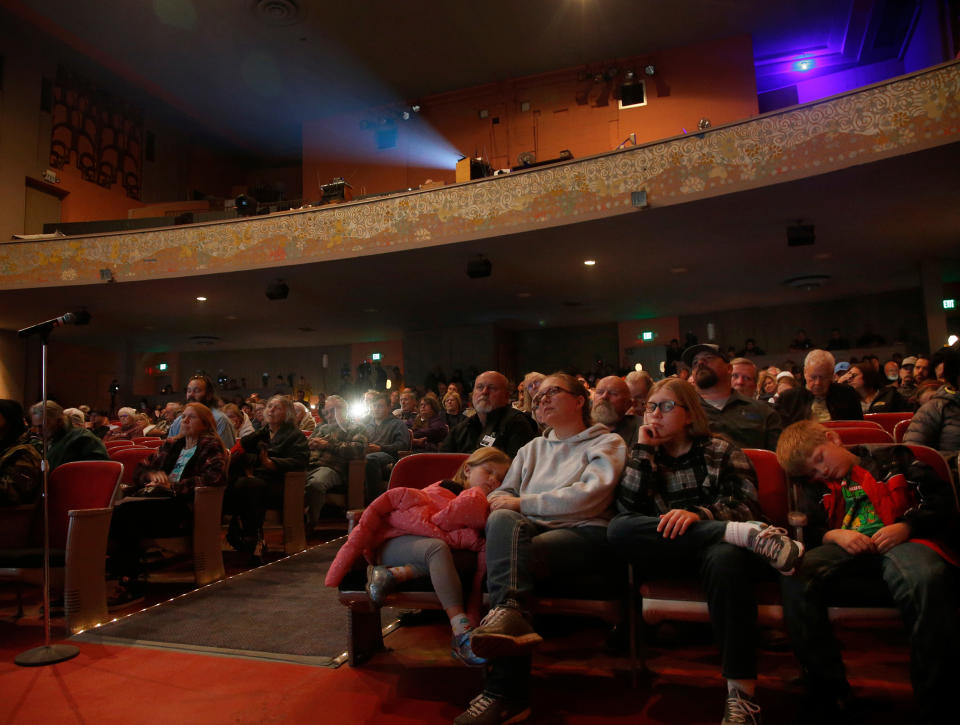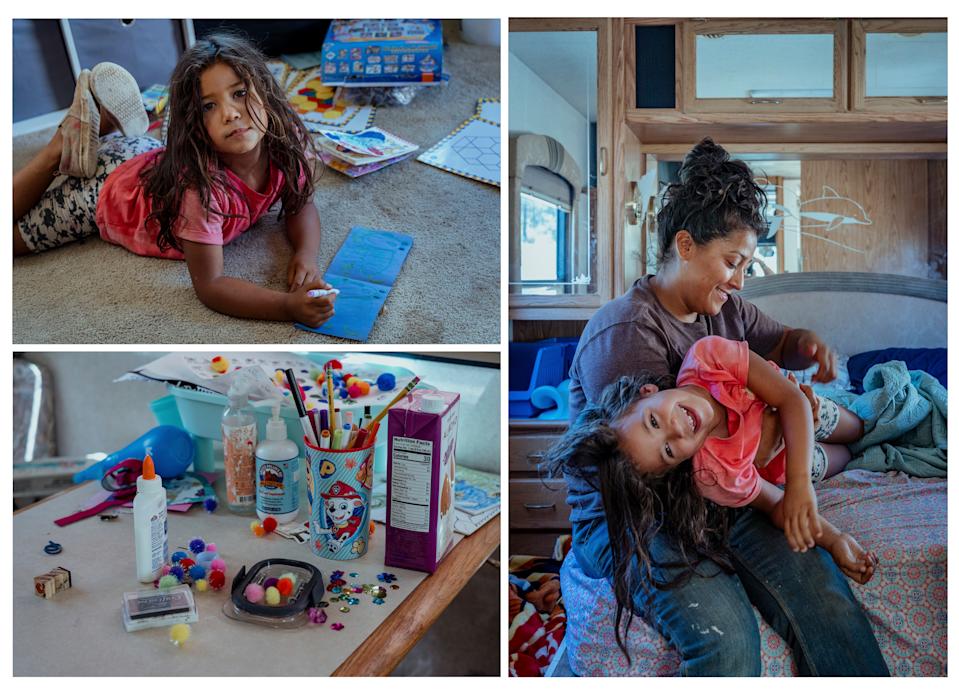Four years after California’s deadliest wildfire, survivors still await their settlement money
CONCOW, Calif. — Some survivors of California's deadliest wildfire continue to live in trailers, tents and makeshift homes nearly four years later as they wait for payments from a trust set up to compensate them.
The PG&E Fire Victim Trust has paid less than half, or $5.2 billion, of the more than $13 billion owed to survivors in the two years since it was established, according to the latest data.
The trust was created in 2020 after Pacific Gas & Electric, the utility found responsible for causing the fire, declared bankruptcy following the 2018 Camp Fire, which killed 85 people and displaced roughly 50,000 others in Northern California's Butte County.
The declaration came after the state's largest utility pleaded guilty to 84 counts of involuntary manslaughter related to the Camp Fire.
“We’re not even close to recovered,” said Inez Salinas, a Concow resident and Camp Fire survivor.


She said she has not received enough money from the trust to rebuild her life: “I just want to move on. I want to move forward.”
Salinas received her first payment of about $60,000 from the trust earlier this year, she said, and used some of it to pay legal fees, buy materials for new property where a "tiny home" is being built and spent the remainder trying to make ends meet as a single mother.
Salinas is owed about $200,000 total, according to the determination letter she received from the trust, but neither she nor her lawyer know when it will be paid in full.
“Each fire, the people from the previous fire just get forgotten,” she said. “Please just don’t forget about us.”
For survivors of the state's deadliest and most destructive wildfire, time is measured by before and after. Before a phalanx of flames advanced from a mountain ridge above Paradise, in the foothills of the Sierra Nevada mountain range, residents of Concow and nearby communities could barely see their neighbors’ properties through dense ponderosa pine trees.


Today, barren plots where homes once brushed against the forest sit forlornly amid burned-out stumps and blackened trees.
PG&E has been blamed for sparking some 30 wildfires since 2017, in part because of faulty or outdated electrical equipment, wiping out about 23,000 homes and businesses across the state and killing more than 100 people.
As part of its restructuring after the bankruptcy filing in 2019, PG&E created the Fire Victim Trust to administer claims filed by roughly 70,000 victims of the wildfires it was found by investigators to be responsible for between 2015 and 2018. But it has been slowed down by the pandemic and corporate restructuring, a spokesman for the trust said.
“The bankruptcy is what threw everything into such a complicated situation,” trust spokesman Steve Burns said. “None of this is easy.”
An expected shortfall extended the delay when half the promised settlement money, consisting of PG&E stock, consistently traded at less than what had been estimated when the deal was struck, Burns added.
Earlier this month, the trust sold 35 million shares of PG&E stock to contribute to the settlement fund. The net proceeds from that sale were over $477 million.
Despite the setbacks, the trust has issued award notices to more than 80% of claimants and set a target of hitting 90% by the end of the year.
“It is my goal to help as many people as possible to get their lives back, their houses back, their businesses back,” Cathy Yanni, who oversees the Fire Victim Trust, said in a statement.
'Stuck in ground zero'
The Camp Fire erupted shortly after 6 a.m. on Nov. 8, 2018. In addition to the 85 deaths, it wiped out the town of Paradise, destroyed 13,696 single-family homes and charred more than 153,000 acres.
Concow resident Eric Sewall was home with his six kids when the smell of smoke lured him outside. Flames were already surrounding the north side of his property as he scrambled to get his children to safety.
“I have never seen anything so evil in my life,” he said.
As he rushed to evacuate his children, Inez Salinas was inside the trailer home she shared with her daughter, River, who was 2 years old and had slept fitfully that night.
Salinas was still awake around 6 a.m. when the smell of smoke wafted inside. Outside, the sky glowed orange as propane tanks exploded in the distance.
Salinas put River in the car and grabbed her phone, purse and a bag of clean laundry from the trailer. She sped down winding mountain roads as “flames larger than trees” approached, she said.
During the next several years, Salinas and her daughter bounced from car to trailer to tent. She cobbled together income from working various jobs as a cannabis trimmer and farmhand, building fences, clearing land and volunteering as a firefighter. She traded favors with neighbors, swapping goods and housework for the same.

“Everyone up here works for each other,” she said.
Anxiety and nightmares still haunt Salinas, who said deep-seated guilt over surviving a fire that killed dozens keeps her up at night.
Like Salinas and Sewall, many displaced residents remain in limbo because they can't afford to rebuild. Some are self-described homesteaders who were already living off the grid before the Camp Fire tore through their communities, pushing them ever closer to poverty.
Across the canyon from Concow, Paradise is rising. Bolstered by county, state and federal dollars, new buildings and homes dot the landscape as construction equipment outnumbers cars on newly paved streets.
But unincorporated areas like Concow, which lack the political clout of wealthier towns like Paradise, have remained largely neglected, its residents nomads piecing together housing and incomes.

“They have focused everything in Paradise, but we’re stuck in ground zero,” said Gunnar Anderson, Sewall’s brother.
Before the fire, Anderson and Sewall were close to finishing an expansion of their two-bedroom home overlooking a lush canyon that separates Concow from Paradise. They planned a four-bedroom house with a large deck facing west for their families to share.
But after the fire, the brothers were reduced to two trailer homes on the land they had once hoped to make into their dream property.
On a hot summer afternoon, they sat side by side in small camping chairs where the two-car garage once stood. Sewall estimated it would cost $330,000 to rebuild the home.
He has received an advanced payment of about $22,000 from the trust, but the extra income cost him his health insurance, he said, adding that he has not received his final determination letter and does not know how much more he might receive.
Anderson, who did not file a claim, has not received any financial assistance from the government or private organizations. The brothers recently founded a small logging company, but business has been slow because some of their clients are also waiting for payouts, Sewall said.
“We had the perfect means to survive up here and we were happy — nothing too much and nothing too little,” he said. “Just the right amount.”
Now, “we’re barely getting by,” he added.
Some 10 minutes away, Salinas and River sat in the shade of a temporary trailer home donated to the family by a charitable organization. Inside, air conditioning powered by a single generator sometimes works and sometimes doesn’t. When it’s too hot to sleep inside, mom and daughter cool off in the nearby river or visit friends with reliable electricity.
They are waiting for a new 400-square-foot tiny home to be built for them by the Tiny Pine Foundation, a nonprofit founded by a 2008 wildfire survivor. Salinas hoped it would be finished by winter, but as the seasons change, it becomes more unlikely, and she worries that housing insecurity could threaten her family.
“I will fight and scrape by and bleed if I have to just to keep [River] safe,” she said. “Everything I’m doing is to make sure she’s stable. I can’t risk her being taken away from me.”

This article was originally published on NBCNews.com


